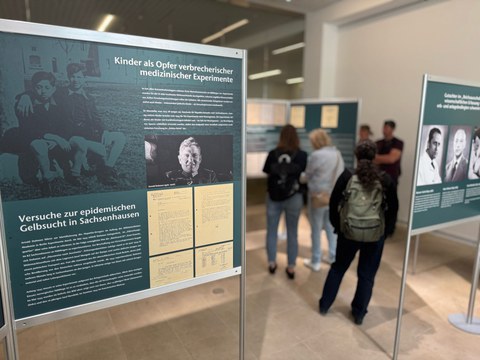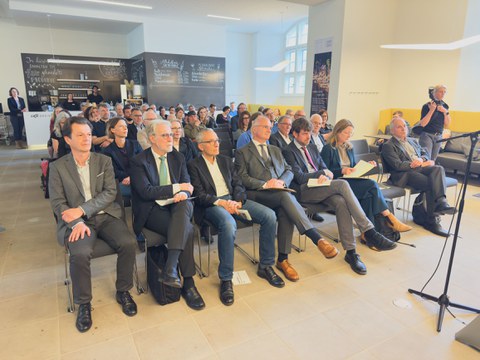Apr 30, 2025
"In memory of the children": Traveling exhibition on National Socialist child "euthanasia" opens its doors in Dresden

Exhibition opening in Dresden's Dreikönigskirche Church
On April 29, the exhibition "In Memory of the Children" by the German Society of Pediatrics and Adolescent Medicine (DGKJ) opened in Dresden's Dreikönigskirche Church. The Institute for the History of Medicine at TU Dresden was the driving force that brought the traveling exhibition to Dresden, after already being shown in 27 cities. Researchers at TUD made sure to add the role of Dresden’s citizens and the pediatric clinic of the Dresden-Johannstadt City Hospital, the predecessor of the University Hospital, during the Nazi era.
Between 1939 and 1945, German doctors declared thousands of children unfit and unworthy of life if they suffered from certain disabilities or incurable diseases. Behind this was the idea of eugenics, according to which hereditary factors, the reproductive capacities and ultimately the lives of these supposedly "useless" people were to be eliminated. The children in question were killed by sleeping pills or malnutrition in euphemistically named "childrens’ wards." They often had to undergo medical tests beforehand.
The exhibition "In Memory of the Children," which can be visited in Dresden's Dreikönigskirche until July 3, 2025, focuses on this chapter of German medicine. The exhibition, conceived by the Historical Commission of the German Society of Pediatrics and Adolescent Medicine, also presents the findings of a local research team from the Institute for the History of Medicine. These show that killings were also carried out in the pediatric clinic of the Dresden-Johannstadt hospital, although there were no childrens’ wards there with this specific objective in mind.

Ausstellungseröffnung mit (v.l.) Janko Haft, Kaufmänischer Vorstand UKD, Prof. Fred Zepp, Präsident DGKJ, Prof. Reinhard Berner, Direktor Klinik und Poliklinik Kinder- und Jugendmedizin UKD, Dr. Erik Bodendiek, Präsident Sächs. Landesärztekammer, Prof. Florian Bruns, TUD, Bürgermeisterin Annekatrin Klepsch und Prof. Thomas Beddies, Medizinhistoriker.
"During our research into the few remaining medical records, we were particularly surprised by the direct, blunt choice of words used by the Dresden-based doctors involved," explains Prof. Florian Bruns, Director of the Institute for the History of Medicine at the Faculty of Medicine of TU Dresden and head of the research team. "Euthanasia of a mongoloid idiot," for example, is the entry documenting the death of a three-month-old girl in the Dresden-Johannstadt Hospital in 1944. "At the time, knowledge of these infant deaths was not just limited to the doctors. This brazen language was unusual. Elsewhere, the perpetrators tried to conceal their deadly intentions," says Bruns.
"Parents and relatives were often deceived and readily placed their children in the hands of the perpetrators in the hope of receiving modern, promising treatment," explains Berlin-based medical historian Prof. Thomas Beddies. "Despite their involvement in such practices, they were often able to continue practicing medicine after 1945." Thomas Beddies was significantly involved in the conception and content design of the exhibition. In his opening lecture, he describes the inhumane experiments on sick or disabled children and young people and their murder as part of the so-called "euthanasia" of children.
After an extended phase of collective repression, the German Society of Pediatrics and Adolescent Medicine acknowledged the responsibility of pediatricians for the medical crimes committed during the Nazi era in 2010. The pediatrician and former president of the DGKJ Prof. Fred Zepp from Mainz, explained: "There must be no targets in research and in the care of patients that can be considered so important and high-ranking that they justify the blatant disregard of individual human dignity and human rights." In a second lecture at the opening of the exhibition, he describes the concept and development of the DGKJ's project on "Pediatrics during the National Socialist era."
In view of the many years of reappraisal and research into child "euthanasia," Florian Bruns cannot understand why even today a few doctors still believe that the state should endorse the use of eugenics in some form. "Such ideas are often suggested under the guise of thought experiments so that they can be dismissed when criticized. History teaches us: There is no such thing as good eugenics. It is always dangerous, both for those affected and for society."
Location: Dreikönigskirche Dresden, Hauptstraße 23, 01097 Dresden
Time: 4:00 pm
The exhibition is open from April 30 to July 3, Monday to Friday, from 10:00 am to 6:00 pm. The location is wheelchair accessible. Admission is free.
Related events:
May 20, 4:00 pm: "The participation of Dresden’s residents in 'child euthanasia'" Lecture by Dr. Marina Lienert, Institute for the History of Medicine, Faculty of Medicine, TU Dresden
June 4, 7:30 pm: Commentated screening of the film Nebel im August (D 2016) at the Schauburg Filmtheater in Dresden
June 24, 4:00 pm: "And nobody wanted this child... - Midwives between appreciation and being used for racial hygiene and child 'euthanasia'?" Lecture by PD Dr. Wiebke Lisner, Institute for Ethics, History and Philosophy of Medicine, Hannover Medical School
Parallel to the exhibition, the spring conference of the research group focusing on National Socialist "euthanasia" and forced sterilization will take place at the Pirna-Sonnenstein Memorial from May 9 to 11.
Further information: https://tu-dresden.de/med/mf/ges/sammlung/ausstellung-im-gedenken-der-kinder-die-kinderaerzte-und-die-verbrechen-an-kindern-in-der-ns-zeit-rahmenprogramm
Contact:
Prof. Florian Bruns
Institute for the History of Medicine
Carl Gustav Carus Faculty of Medicine
of TUD Dresden University of Technology
Tel: +49 351 3177 402
Anne-Stephanie Vetter
Public Relations Office
Carl Gustav Carus Faculty of Medicine
of TUD Dresden University of Technology
+49 351 458 17903
anne-stephanie.vetter@tu-dresden.de
www.tu-dresden.de/med
